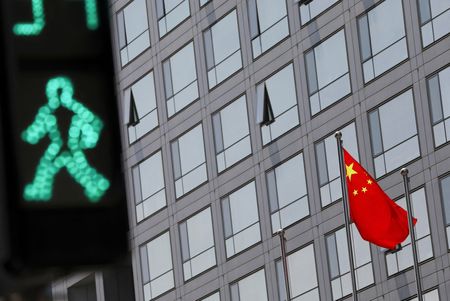 1
1 1
1

HONG KONG (Reuters) – Washington and Beijing have reached an agreement allowing U.S. auditors to inspect China-based accountants, the first step in a process that could prevent around 200 Chinese companies being kicked off American stock exchanges.
SAMUEL SIEW, MARKET SPECIALIST, CGS-CIMB, SINGAPORE
“This is seen as a positive first step. However, things are not fully cast in stone yet, as seen from the various sudden reversals in the past.”
KENNY NG, SECURITIES STRATEGIST, CHINA EVERBRIGHT SECURITIES, HONG KONG
“I think if the agreement is finally to be reached, the market sentiment will keep improving, which will support the Hong Kong stock market, especially the technology sector.
“For the short term, the HSI will keep the upward momentum and may challenge the 21,000 level next week. For the midterm, the recovery progress of the Chinese economy will be the core factor for the stock market.”
PAUL LEDER, MILLER & CHEVALIER, WASHINGTON DC, FORMER DIRECTOR OF THE SEC’S OFFICE OF INTERNATIONAL AFFAIRS
“Clearly the Chinese authorities felt the pressure of possible delistings under the Holding Foreign Companies Accountable Act. By explicitly tying the ability to maintain a U.S. listing to the PCAOB’s ability to conduct inspections of a company’s auditors, Congress imposed a cost on China for its long-standing refusal to permit the PCAOB to conduct inspections of U.S.-registered accounting firms located in mainland China and later Hong Kong.
“The real issue is whether the Chinese authorities will now honor the deal and provide the PCAOB unfettered access to the auditors’ work papers. For more than a decade the answer has been ‘No,’ but now that the threat of delisting is real it looks likes the answer from the Chinese authorities may be different.”
WINSTON MA, ADJUNCT PROFESSOR, NYU LAW SCHOOL
“This is a compliance issue, so the implementation of this framework in the coming months will be the key to the success of this complex cross-border setup.”
MARCIA ELLIS, LAWYER AT MORRISON & FOERSTER, HONG KONG
“We expect that Chinese headquartered companies with sensitive data that have not yet listed will favor listings in Hong Kong even if the PCAOB issue is resolved.”
“In addition, listing in Hong Kong also insulates companies from what may continue to be a contentious relationship between the U.S. and China in the next few years even if the PCAOB issue is resolved.”
THOMAS HAYES, MANAGING MEMBER, GREAT HILL CAPITAL, NEW YORK
“A long time coming! This has been a huge overhang on Chinese ADRs – causing some of the higher quality businesses like Alibaba to be mis-priced for some time. As the deal moves forward and the fog is lifted, many of these stocks will have significant appreciation. Not because the business changed (the big tech platforms have weathered the pandemic and crackdown fairly unscathed fundamentally), but because the uncertainty has been removed – inviting investors back to group.”
ZHANG ZIHUA, CHIEF INVESTMENT OFFICER, BEIJING YUNYI ASSET MANAGEMENT
“This is definitely great news for U.S.-listed Chinese companies, in particular the leading tech firms, as they don’t have to worry about being forced to delist from New York due to regulatory reasons. And their valuations can also be repaired.”
TARIQ DENNISON, MANAGING DIRECTOR, GFM ASSET MANAGEMENT
“It could signal an economic hunger for capital, but the bigger signal I think is how many investors believe this is a clear sign that the direction is back towards “Open China”, and not the “Closed China” that many Anglophone writers seem to have increasingly feared in recent years.
“My bear case on China for the past year plus has really been a dystopian scenario of China cutting itself off from the West in significant ways … this agreement would seem to put a big dent (of relief) in that bear case.
“I plan to continue allocating time and capital to China, it’s just too big and too important to ignore. If this results in better quality financials, of course that would be a huge plus.”
(Reporting by Bansari Mayur Kamdar in Bengaluru, Yiming Shen in Shanghai, Julie Zhu and Xie Yu in Hong Kong and Tom Westbrook in Singapore; editing by Carmel Crimmins)